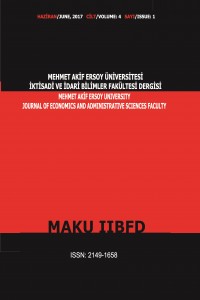Abstract
1990’lardan itibaren çeşitli uluslararası organizasyonlar tarafından
Balkanlar Bölgesi iki ayrı alt bölge olarak kategorize edilmeye başlanmıştır.
Birinci alt bölge; Arnavutluk, Bosna-Hersek, Sırbistan, Karadağ, Kosova,
Hırvatistan ve Makedonya’dan oluşan Batı Balkanlar Bölgesi’dir. Diğer alt bölge
ise Bulgaristan ve Romanya’dan ibaret olan Doğu Balkanlar Bölgesi’dir. Doğu
Balkanlar’da yeralan ülkeler, Soğuk Savaş sonrasında önemli bir gecikme
olmaksızın Avrupa Birliği’ne üye olmuşlardır. Batı Balkanlar ise gerek yaşadığı
sorunlu tarihsel süreç, gerekse etnik, sosyal ve ekonomik açıdan karmaşık yapısı
nedeniyle, AB üyeliği yolunda zorlu bir süreç yaşamaktadır. AB, arka bahçesi
olarak gördüğü bu bölgede ortaya çıkacak gerginlik ve çatışmaların kendi
istikrarını da etkileyebileceğini bilmektedir. Bu nedenle AB, Batı Balkanlar’da
zayıf olan devlet yapısını demokratikleştirmeye ve güçlendirmeye çalışmaktadır.
AB, bu amacını gerçekleştirirken koşulluluk ve sosyalizasyon politikalarını
araç olarak kullanmaktadır. Bu çalışmada AB’nin uyguladığı koşulluluk ve
sosyalizasyon politikalarının Batı Balkanlar üzerindeki etkileri
incelenecektir.
Keywords
References
- ALUJEVİC, L. (2012), Integration of Western Balkans: From Reconciliation to European Future, Centre for European Studies, Brussels.
- ARASTADAKİSİ, O. (2005), “The Europenization of the Balkans” The Brown Journal of World Affairs, 12(1), 77-89.
- ANASTAKİS, O. (2008), “The EU’s Political Conditionality in the Western Balkans: Towards a More Pragmatic Approach”, Southeast European and Black Sea Studies, 8 (4), 365-377.
- BARNES, I. - BARNES, P. (2007), Enlargement”, European Union Politics, Editör: Michelle Cini, Oxford University Press, New York, 227-241.
Abstract
After 1990s, The Balkans Region has been categorized as two different sub regions by various
international organizations. The first sub region is the Western Balkans, consisting of
Albania, Bosnia and Herzegovina, Serbia, Montenegro, Kosovo, Croatia and Macedonia. The
other sub region is the Eastern Balkans Region consisting of Bulgaria and Romania. The
countries in the Eastern Balkans became members of the European Union without any
significant delay after the Cold War. The Western Balkans, on the other hand, face a
challenging process towards EU membership due to the problematic historical process they
live in, and because of their complex structure in ethnic, social and economic terms. The EU
knows that the tension and conflicts that will emerge in this region, which it regards as its
backyard, can also affect its own stability. For this reason, the EU is trying to democratize and
strengthen the weak state structure in the Western Balkans. The EU uses the policies of
conditionality and socialization as a means to achieve this goal. In this study, the effects of the
EU's conditionality and socialization policies on the Western Balkans will be examined.
References
- ALUJEVİC, L. (2012), Integration of Western Balkans: From Reconciliation to European Future, Centre for European Studies, Brussels.
- ARASTADAKİSİ, O. (2005), “The Europenization of the Balkans” The Brown Journal of World Affairs, 12(1), 77-89.
- ANASTAKİS, O. (2008), “The EU’s Political Conditionality in the Western Balkans: Towards a More Pragmatic Approach”, Southeast European and Black Sea Studies, 8 (4), 365-377.
- BARNES, I. - BARNES, P. (2007), Enlargement”, European Union Politics, Editör: Michelle Cini, Oxford University Press, New York, 227-241.
Details
| Primary Language | Turkish |
|---|---|
| Subjects | Political Science |
| Journal Section | Articles |
| Authors | |
| Publication Date | June 30, 2017 |
| Submission Date | March 3, 2017 |
| Published in Issue | Year 2017 Volume: 4 Issue: 1 |

This work is licensed under a Creative Commons Attribution 4.0 International License.
The author(s) bear full responsibility for the ideas and arguments presented in their articles. All scientific and legal accountability concerning the language, style, adherence to scientific ethics, and content of the published work rests solely with the author(s). Neither the journal nor the institution(s) affiliated with the author(s) assume any liability in this regard.

